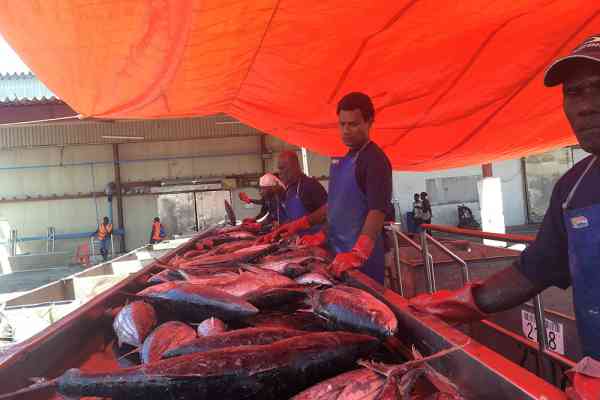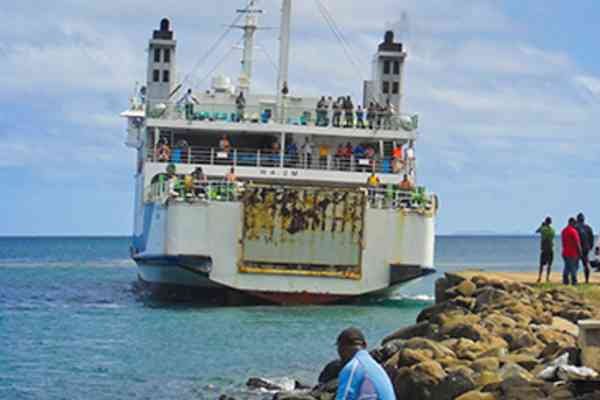For centuries, pacific people have travelled across the vast oceans using traditional canoes and other means of transportation. Today hundreds of thousands of people are dependent on sea and shipping services for business, inter-island travel or just the daily commute to get to work or school.
Sea transportation is also the only source of income for many in the region like 29 year old Frankie Kaltex who operates a water taxi in Port Vila, Vanuatu, one of the busiest ports in the region.
“When it’s a normal day with no cruise ships in port, sometimes we do not earn enough and struggle into the next day. Any money we are able to make we try and keep it till the end of the week then we start paying for the electricity, water bill and food supplies.”
While about 90% of goods and people are transported using domestic shipping, it is considered the lifeline and main driver for economic development in the region. Director Ports and Harbour in Port Vila Henry Worek says the economy would come to a standstill without sea transportation.
“Domestic shipping is the life line. Without the support of domestic shipping, development does not go to and fro, so it is the life line and it will remain the life line. It is the link between any of the rural areas and the two main towns for produce that needs to be exported and without it this would not be possible.”
But the bigger the boat, the bigger the responsibility. Following two major maritime disasters in Kiribati and Tonga in 2009, Pacific Island leaders highlighted the need to accelerate the implementation of safety protocols on domestic shipping vessels in the region.
In 2010 the Pacific Community or SPC designed and advocated the Pacific Islands Domestic Ship Safety or PIDSS Programme.
The main goal of PIDSS is to STRENGTHEN MARITIME SAFETY ON DOMESTIC VESSELS through adoption and implementation of a Safety Management System by the domestic shipping companies and their fleet:
The components of this safety programme include;
- Review the status of domestic ships in the region,
- Provide safety trainings and templates for Safe Operational Plans (SOPs) to support a Safety Management System
- Conduct maritime safety audits to test the effectiveness of implementation of SOPs
Tonga and Kiribati were selected for the pilot since its inception in 2010. In total, there are 10 countries now participating, to date, and it is likely to get 3 more countries on board in the next 3 years (to 2021).
SPC’s Ship Safety Audit Adviser, Oceans & Maritime Program Omirete Tabureka is leading his team to conduct training for shop owners and operators on improving safety measures and put in place guidelines to follow.
“Through the PIDSS program, we are trying to improve the safety of domestic vessels through implementation of a safety management system so we came up with safe operation plans. These are more or less like safety manuals for the ships and how to implement the safety procedures. It’s all about safe operations of the ships and pollution prevention.”
SPC, in partnership with KfW Development Bank has been working closely with the Office of the Maritime Regulator (OMR) and the Department of Ports and Harbor in Vanuatu to implement the requirements under the PIDSS. SPC has conducted a number of training workshops for vessel operators and owners and the initiative is being well received.
Ocean Logistics Limited based in Port Vila provides barge services for transporting construction equipment and materials to the outer islands, contributing significantly towards development in Vanuatu.
Director of Oceans Logistics Andrew Bohn believes all operators and owners will eventually recognize the need for the PIDSS.
“We are absolutely supportive of the initiative that the OMR is bringing in through SPC to improve maritime safety and governance. We have heard calls from clients, the passengers, people travelling to the islands, people shipping cargo to the islands and then from the crew members themselves, and everyone wants a safer travel and work environment. For the ship owners having their vessels not sink or get damaged helps shipping become more profitable as well and make shipping in Vanuatu safer.”
Planned audits are conducted by the SPC team on selected vessels which have implemented their SOPs as part of the process to ensure compliance to the safety operating procedures. The vessels are provided with check list templates and during the audit, the teams board the vessels and conduct physical checks to ensure compliance.
Henry Worek say don’t want any more lives to be lost to the seas due to vessel inefficiencies.
“Safer seas, cleaner oceans. These two words mean a lot. That is what the industry is aspiring to and improvement in everything across the maritime sector to ensure that our domestic ships are safer, there is no loss of lives and safe shipping improves economic impact to the islands.”
SPC continues to work with stakeholders in 12 Pacific island countries to implement the requirements under PIDSS. There is growing confidence that the culture of safety will bring about safer domestic shipping services.

